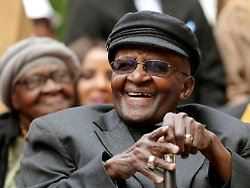Sunday, December 26th, 2021
Obama, Steinmeier, Johnson
Worldwide mourning for the reconciler Desmond Tutu
Mourning South Africans gather in front of the late Desmond Tutu’s house. “He was such a good person,” says one woman. Even heads of state around the world can hardly put it into words better. “The Arch” was the moral compass in the fight against apartheid.
After Desmond Tutu’s death, numerous politicians paid tribute to the South African Nobel Peace Prize laureate and anti-apartheid fighter. Tutu’s death is “another chapter of mourning in our nation’s departure from a generation of outstanding South Africans who left us a liberated South Africa,” said President Cyril Ramaphosa. The retired archbishop, who died at the age of 90, was considered a moral compass in his homeland – even long after the end of apartheid.
He expressed “on behalf of all South Africans his deep sorrow,” said Ramaphosa. Tutu was “a man of extraordinary intelligence, of integrity and invincible against the forces of apartheid” and stood up for “the oppressed around the world”.
Former US President Barack Obama called Tutu a “mentor and friend”. The archbishop was a “universal spirit” “who was rooted in the struggle for liberation and justice in his own country, but also dealt with injustice around the world,” said Obama. Tutu tried to “find humanity in his opponents”.
Nobel Peace Prize Laureate in a wheelchair
“The Arch”, as Tutu was affectionately called by the South Africans in allusion to his office and his role as a reconciler, never tire of messing with the leadership of his country and denouncing corruption and grievances, even in old age. He also messed with his Anglican Church when he criticized their approach to homophobia. Most recently, however, the Nobel Peace Prize laureate, known as cheerful and energetic, rarely appeared in public.
In May he showed himself to his compatriots when he and his wife Leah received the Covid vaccination. Sitting in a wheelchair, he waved at the cameras – an image that was difficult to reconcile with the lively man who once captivated the world with his harsh criticism of South Africa’s apartheid regime. He was last seen in public at the celebrations for his 90th birthday. In front of his former parish in Cape Town and in front of his house, mourners gathered on Sunday and laid flowers. “It’s very, very sad that he died. He was such a good person,” said retired accountant Diane Heard.
Steinmeier sees tutu as a role model
Federal President Frank-Walter Steinmeier paid tribute to the deceased South African clergyman as one of the world’s most distinctive fighters for democracy and human rights. “His unwavering commitment against apartheid should serve as a model for all of us to work incessantly against racism and inequality,” said the German head of state in a letter of condolence. Britain’s Prime Minister Boris Johnson was also “deeply saddened”. “He was a key figure in the fight against apartheid and in the struggle to create a new South Africa – and will be remembered for his spiritual guidance and irrepressible good humor,” wrote Johnson on Twitter.
The Vatican issued a declaration praising Tutu for “promoting racial equality and reconciliation”. Tutus “The fight for the end of apartheid and the South African reconciliation will stay in our memories,” said French President Emmanuel Macron.
First black bishop of Johannesburg
Tutu, born on October 7, 1931 in Klerksdorp near Johannesburg, was ordained an Anglican priest at the age of 30. In 1984 he was awarded the Nobel Peace Prize for his opposition to the apartheid regime in South Africa. In the same year he became the first black bishop of Johannesburg and called for an embargo on the government of the white minority. While the political champions around Nelson Mandela were in prison, Tutu campaigned for justice.
Tutu received one of his most important assignments after the end of apartheid: from 1996 he headed the Truth and Reconciliation Commission, which held public hearings on the atrocities during apartheid. The bishop coined the phrase “rainbow nation” for South Africa when Mandela became the country’s first black president in 1994.
